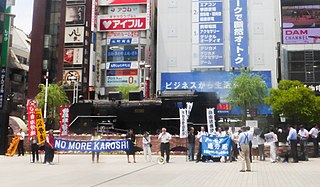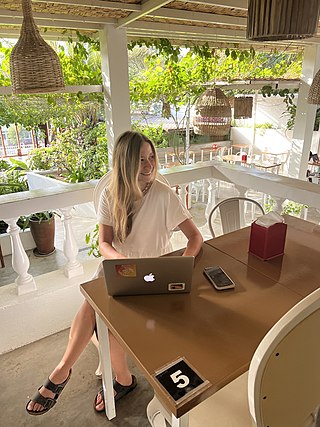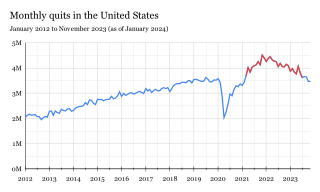Related Research Articles

Karoshi, which can be translated into "overwork death", is a Japanese term relating to occupation-related sudden death.

Remote work is the practice of working from one's home or another space rather than from an office.
Work-to-rule is a job action in which employees do no more than the minimum required by the rules of their contract or job, and strictly follow time-consuming rules normally not enforced. This may cause a slowdown or decrease in productivity if the employer does not hire enough employees or pay the appropriate salary and consequently does not have the requirements needed to run normally. It is a form of protest against low pay and poor working conditions, and is considered less disruptive than a strike; obeying the rules is not susceptible to disciplinary action or loss of pay. It can also highlight rules that are technically in place but impractical and thus hamper the organization, if they were to be followed as written.

Workforce productivity is the amount of goods and services that a group of workers produce in a given amount of time. It is one of several types of productivity that economists measure. Workforce productivity, often referred to as labor productivity, is a measure for an organisation or company, a process, an industry, or a country.
A virtual workplace is a work environment where employees can perform their duties remotely, using technology such as laptops, smartphones, and video conferencing tools. A virtual workplace is not located in any one physical space. It is usually a network of several workplaces technologically connected without regard to geographic boundaries. Employees are thus able to interact in a collaborative working environment regardless of where they are located. A virtual workplace integrates hardware, people, and online processes.
Employee monitoring software, also known as bossware or tattleware, is a means of employee monitoring, and allows company administrators to monitor and supervise all their employee computers from a central location. It is normally deployed over a business network and allows for easy centralized log viewing via one central networked PC. Sometimes, companies opt to monitor their employees using remote desktop software instead.

Coworking is an arrangement in which workers for different companies share an office space. It allows cost savings and convenience through the use of common infrastructures, such as equipment, utilities and receptionist and custodial services, and in some cases refreshments and parcel acceptance services. It is attractive to independent contractors, independent scientists, remote workers, digital nomads, and people who travel frequently. Additionally, coworking helps workers avoid the feeling of social isolation they may experience while remote working or traveling and eliminate distractions in home office. Most coworking spaces charge membership dues. Major companies that provide coworking space and serviced offices include WeWork, IWG plc, Industrious, and Impact Hub.
A four-day workweek is an arrangement where a workplace or place of education has its employees or students work or attend school, college or university over the course of four days per week rather than the more customary five. This arrangement can be a part of flexible working hours, and is sometimes used to cut costs.

Digital nomads are people who travel freely while working remotely using technology and the internet. Such people generally have minimal material possessions and work remotely in temporary housing, hotels, cafes, public libraries, co-working spaces, or recreational vehicles, using Wi-Fi, smartphones or mobile hotspots to access the Internet. The majority of digital nomads describe themselves as programmers, content creators, designers, or developers. Some digital nomads are perpetual travelers, while others only maintain the lifestyle for a short period of time. While some nomads travel through multiple countries, others remain in one area, and some may choose to travel while living in a vehicle, in a practice often known as van-dwelling. In 2023, there were 17.3 million American digital nomads, which was a 131% increase since 2019.
A “toxic workplace” is a colloquial metaphor used to describe a place of work, usually an office environment, that is marked by significant personal conflicts between those who work there. A toxic work environment has a negative impact on an organization's productivity and viability. This type of environment can be detrimental to both the effectiveness of the workplace and the well-being of its employees.
Bring your own device —also called bring your own technology (BYOT), bring your own phone (BYOP), and bring your own personal computer (BYOPC)—refers to being allowed to use one's personally owned device, rather than being required to use an officially provided device.

Wellness tourism is voluntary travel to world-wide destinations for the purpose of promoting health and well-being through physical, psychological, or spiritual activities.
Corporate surveillance describes the practice of businesses monitoring and extracting information from their users, clients, or staff. This information may consist of online browsing history, email correspondence, phone calls, location data, and other private details. Acts of corporate surveillance frequently look to boost results, detect potential security problems, or adjust advertising strategies. These practices have been criticized for violating ethical standards and invading personal privacy. Critics and privacy activists have called for businesses to incorporate rules and transparency surrounding their monitoring methods to ensure they are not misusing their position of authority or breaching regulatory standards.

Remote Year is a company that facilitates travel and accommodations for people working or interested in working remotely. For $2,000-3,000 per month, Remote Year organizes accommodation, workspaces and professional and local activities to enable participants to travel while continuing to work and to foster a sense of community amongst the group traveling together. The program includes a 12-month trip across 12 cities in various countries. across four continents Remote Year has hosted employees from over 300 companies participating in the program.
Bleisure travel is a portmanteau of "business" and "leisure", referring to a trend among business travellers to add on some sightseeing to a trip.

The Great Resignation, also known as the Big Quit and the Great Reshuffle, was a mainly American economic trend in which employees voluntarily resigned from their jobs en masse, beginning in early 2021 during the COVID-19 pandemic. Among the most cited reasons for resigning included wage stagnation amid rising cost of living, limited opportunities for career advancement, hostile work environments, lack of benefits, inflexible remote-work policies, and long-lasting job dissatisfaction. Most likely to quit were workers in hospitality, healthcare, and education. In addition, many of the resigning workers were retiring Baby Boomers, who are one of the largest demographic cohorts in the United States.
In human resources, resenteeism refers to a form of professional dissatisfaction wherein individuals choose to remain in unfulfilling jobs breeding resentment and a sense of entrapment. This is because they either unable to find a more applicable position, or are concerned about the perceived risks associated with changing employment. Individuals experiencing resenteeism will have poor employee engagement and may appear disillusioned, embittered, miserable, and unhappy. Resenteeism arose following the COVID-19 pandemic and the Great resignation where people reevaluated their work-life balance in the face of cost-of-living increases and is an extension of quiet quitting. Resenteeism is a form of occupational burnout.
Loud quitting refers to a type of employee disengagement in which individuals openly share their discontent, desire for change, and intention to leave. These individuals may refuse to do tasks that they deem unnecessary and by sharing their contempt with colleagues, may spread their disenchantment and disengagement. Loud quitting may arise from perceived workplace inequities, subpar compensation, and an unresponsive employer.
In human resources, coffee badging refers to the act of employees going to the office after clocking in for a brief period, typically long enough to grab a coffee, before departing to work from elsewhere. This is done to fulfill office attendance requirements by hybrid and remote workers which arose following the return to in-person work following the COVID-19 pandemic.
Productivity theater is a form of impression management where an employee acts productively in the workplace, typically by appearing busy or unavailable, without actually being productive.
References
- 1 2 3 4 5 Bologna, Caroline (26 March 2024). "Are You Daring Enough To Try A 'Hush Trip'? What To Know About The Travel Trend". HuffPost. Retrieved 24 June 2024.
- 1 2 Berger, Chloe (February 6, 2023). "'Hush trips' are the next big trend your worker won't tell you about". Fortune. Retrieved 24 June 2024.
- ↑ Lucas, Suzanne (May 7, 2024). "It's Time to Make Hush Trips a Fireable Offense Secret employee travel sounds cool, but it could be a nightmare". Inc. Retrieved 24 June 2024.
- ↑ Pitrelli, Monica (19 June 2023). "These workers take 'hush trips.' Here's how they're hiding them from the boss". CNBC. Retrieved 24 June 2024.
- ↑ Anas, Brittany (May 17, 2024). "What's A Hush Trip—And Can It Get You In Trouble With Your Boss?". Forbes. Retrieved 24 June 2024.
- ↑ Stone, Lillian (December 26, 2023). "Ten work buzzwords that took over in 2023". www.bbc.com. Retrieved 24 June 2024.